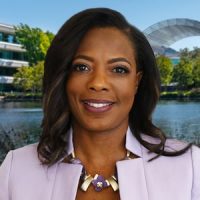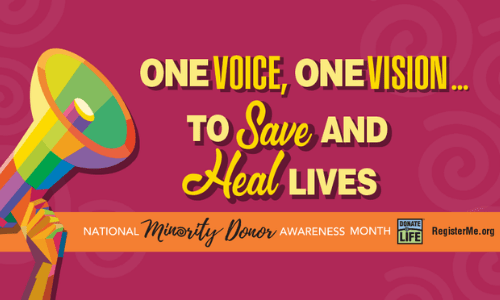
CONTACT:
MEDIA@AOPO.ORG
National Minority Donor Awareness Month
Janice F. Whaley, Chief Executive Officer, Donor Network West

- Briefly describe yourself and the role you play at your organization
I have been working in the organ and transplantation industry for more than 28 years to help save and heal the lives of more than 100,000 men, women, and children waiting for a lifesaving organ transplant. As the Chief Executive Officer of Donor Network West, the second largest organ procurement organization in the United States, I am responsible for driving organ, eye, and tissue recovery performance to support the more than 13 million people in Northern California and Northern Nevada. - As a Native Black American woman, what did your path to this position look like? What struggles or challenges did you face during your career?
I am the first Black female OPO CEO in the nation. The journey which led me to this day was not by accident but intentionally mapped out, beginning with my postgraduate studies in Epidemiology at the University of Alabama at Birmingham during which I started my career at Alabama Organ Center as a Procurement Coordinator. As I worked my way up the ranks, I had the opportunity to work in just about every area of the organ and transplantation industry including clinical management, organ preservation, family counseling, hospital development, public awareness, and tissue recovery. Years of hard work led me to the opportunity at LifeGift in Houston, Texas, the fourth largest city in the U.S., a majority-minority city, where I became the Managing Director of Clinical Operations overseeing of all clinical aspects of organ and tissue recovery. We produced results during my time there, increasing organ donors by 85% to 190 donors per year. Following my position at LifeGift, I went on to serve as the Executive Vice President and Chief Operating Officer at LifeShare of Oklahoma, where we doubled the number of organ donors early on in my five-year tenure.
I attended and completed the Harvard Business School Executive Education Program full-time in-between the positions above, honing my financial and executive leadership development, being challenged, and taught by some of the nation’s greatest intellectuals and business leaders. Those are opportunities that have not been routinely sought by or granted to Black Americans and other minorities throughout our history although that has been changing. My attitude in gaining knowledge in this way and from this esteemed institution is one of deep gratitude.
While the past twenty-eight years have been rewarding, the journey was not always easy, and some would say longer than expected. Systemic racism is not a bad word; – it is a reality. For Native Black Americans and other minorities, that reality is an omnipresent weight factored into all decisions and actions and nuances are examined through multiple layers. As a Black American female, there is the additional weight of sexism.
I was overlooked at times for opportunities that I was by all honest measures over-qualified for, none the less, I knew that I had to reach greater distinction, be better than the best, to get to where I wanted to be. At times, this journey was lonely and isolated, being passively as well as at times actively, discouraged by bosses, colleagues, advisors, and others from seeking positions of executive leadership that would place me at the decision making table. To borrow a few words from the late John Lewis seems appropriate at this time: “Never give up. Never give in.” I am where I am today because of my family support and a few mentors who took me under their wing, believed in me and guided me along. I would not be where I am today if it were not for them.
Those experiences fueled my determination, introducing me to the power of resilience. In the end, I benefited from that negativity and I would change nothing in my past. I fought and persevered. It is not lost on me, however, that others have not been as successful in jumping through these unfair hoops that are disproportionately placed on the shoulders and careers of my Black/Brown/&other colleagues. These hoops, barriers, whatever you want to call them, serve to weed out many deserving people from reaching their dreamt-of goals. Career advancement, access to good jobs and advancement, workplace satisfaction and fair compensation are a bedrock issue in systemic racism. - What are some lessons you have learned during your time as CEO of Donor Network West?
Never underestimate the power of listening and quick wins. I came to an organization that in one year had 92 more organ donors and 150 more organs transplanted. They had a new leader that listened and was transparent with good and bad news. We are now moving ahead full throttle on team engagement making sure that we communicate effectively and ask the for feedback. When you do these things, your team will rally behind you and achieve unprecedented results as we did in 2019 and continue to do even during the COVID pandemic. As has been my custom and requirement of course and perhaps most importantly, I continue to work hard and stay laser focused on mission. - What do you think are the biggest obstacles that OPOs face when it comes to multicultural outreach?
The biggest obstacle that OPOs face when it comes to multicultural outreach is the lack of diverse representation among OPO staff. Each community has varying reasons as to why they choose to donate or not, however, one of the most convincing ways to get someone to choose to donate is to be able to understand where they are coming from and address their concerns and this is much easier to do when the person having the conversation looks like and can identify with the same life experiences. Humble inquiry and listening are key to engaging diverse communities. We must also find ways to give back and not just engage and educate about donation. - What steps can OPOs take to increase awareness about organ donation especially in multicultural communities?
These are truly but a few of them and I believe that these will become even more evident to everyone as the search for social justice in this country grows:- Listen.
- Provide for focus groups in the multicultural communities that we serve.
- Actively seek and recruit ambassadors within the communities to lead the discussion in all community circles and in power circles, about the issues facing black and brown communities. Empower these OPO ambassadors; do not give them lip service.
- Hire black/brown/other minority staff to at least the same proportion of staff as their numeric representation of the community, if not more.
- Hire and promote black/brown/other minority staff to OPO leadership positions to at least the same proportion of staff as their numeric representation of the community, if not more.
- Engage political power structure, particularly multicultural elected officials to provide avenues of advancement for the OPO mission as well as multicultural staff within the OPO who might assist in advancing the elected officials own multicultural efforts to benefit multicultural communities. This provides both community benefit as well as personal fulfillment opportunities for both the official as well as individual OPO staff member who are already engaged in altruistic efforts to benefit the community.
- Provide leadership opportunities and mentors for minority staff to whom they can relate and to whom they aspire to emulate.
- How can OPOs ensure they have a diverse candidate pool and incorporate diversity and inclusion into the workplace?
Diverse candidates are not hard to find. OPOs just have to be open to hiring them. Since there is a lack of diversity currently in the OPO industry, hiring managers must be willing to hire qualified candidates from outside the OPO industry and teach them about the OPO business, as they do with other similarly qualified non-minority candidates. Hiring diverse candidates from outside the OPO field is an important step not only to increase diversity in the workplace but to also help advance the work of OPOs through innovative techniques and best practices used in successful organizations outside of the OPO industry. Bringing and helping Black/Brown/&other people into the workforce creates the pipeline to develop and groom future minority CEOs and other leaders within the organization. This is something to which corporate boards of directors have long been accustomed. Accustomed to or not, our industry must take action now, not only because justice requires that minorities begin to fill the executive and top positions, but because without doubt, this allows these public organizations, OPOs, to fulfill our mission to save more lives through organ donation by reaching our entire human populace in a way in which we recognize ourselves in all donation activities and leadership positions, eliminating “other”.
###
National Minority Donor Awareness Month is a collaborative initiative of the National Organ, Eye and Tissue Donation Multicultural Action Group to save and improve the quality of life of diverse communities by creating a positive culture for organ, eye and tissue donation. National Minority Donor Awareness Month stems from National Minority Donor Awareness Week, founded in 1996 by the National MOTTEP to bring heightened awareness to donation and transplantation in multicultural communities – focusing primarily on African American/Black, Hispanic/Latinx, Asian Pacific Islander and American Indian/Alaskan Native communities.
The National Multicultural Action Group includes the Association for Multicultural Affairs in Transplantation(AMAT), Association of Organ Procurement Organizations (AOPO), Donate Life America (DLA), Health Resources & Services Administration (HRSA), National Minority Organ Tissue Transplant Education Program (MOTTEP) and National Kidney Foundation (NKF).

